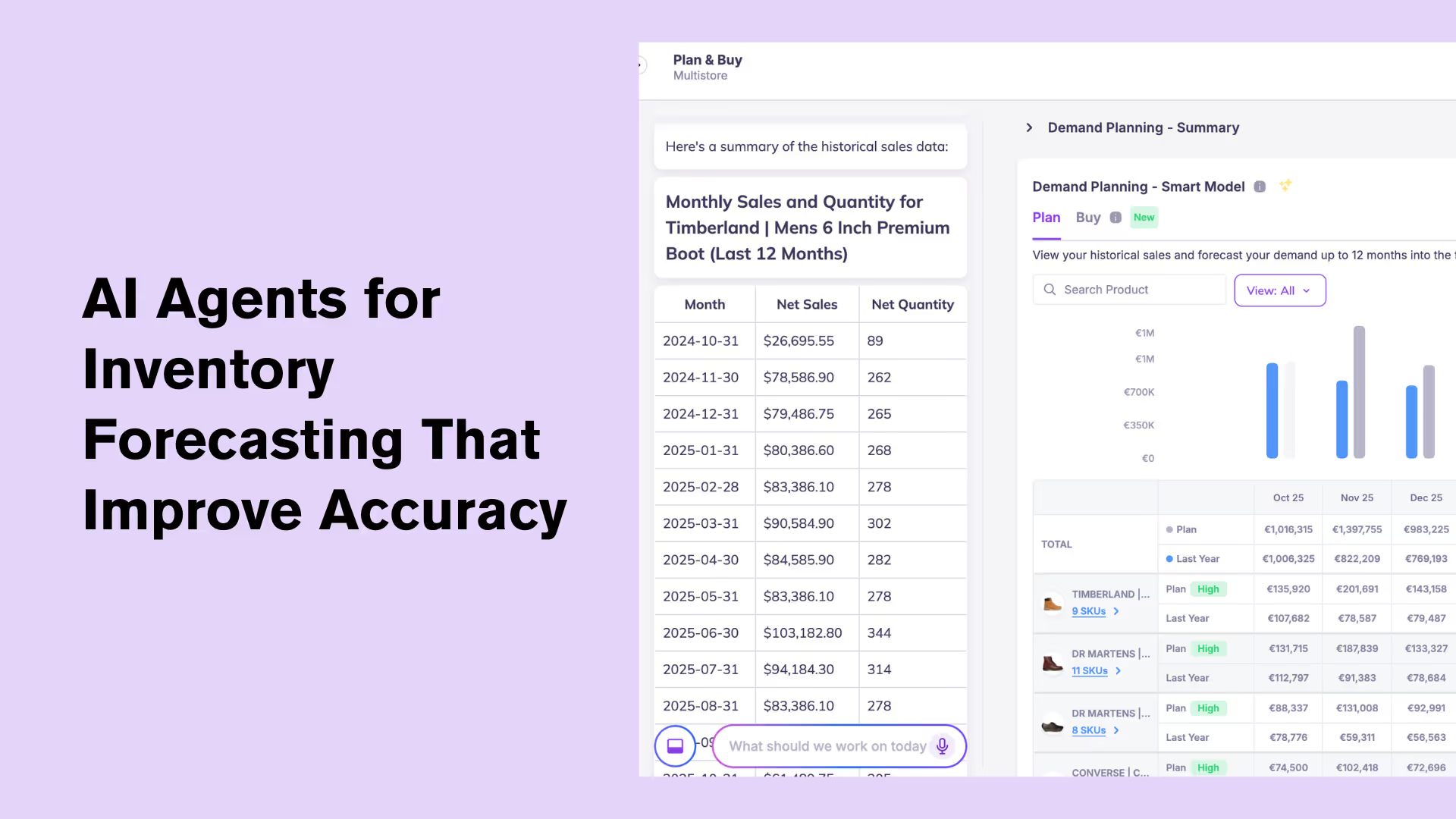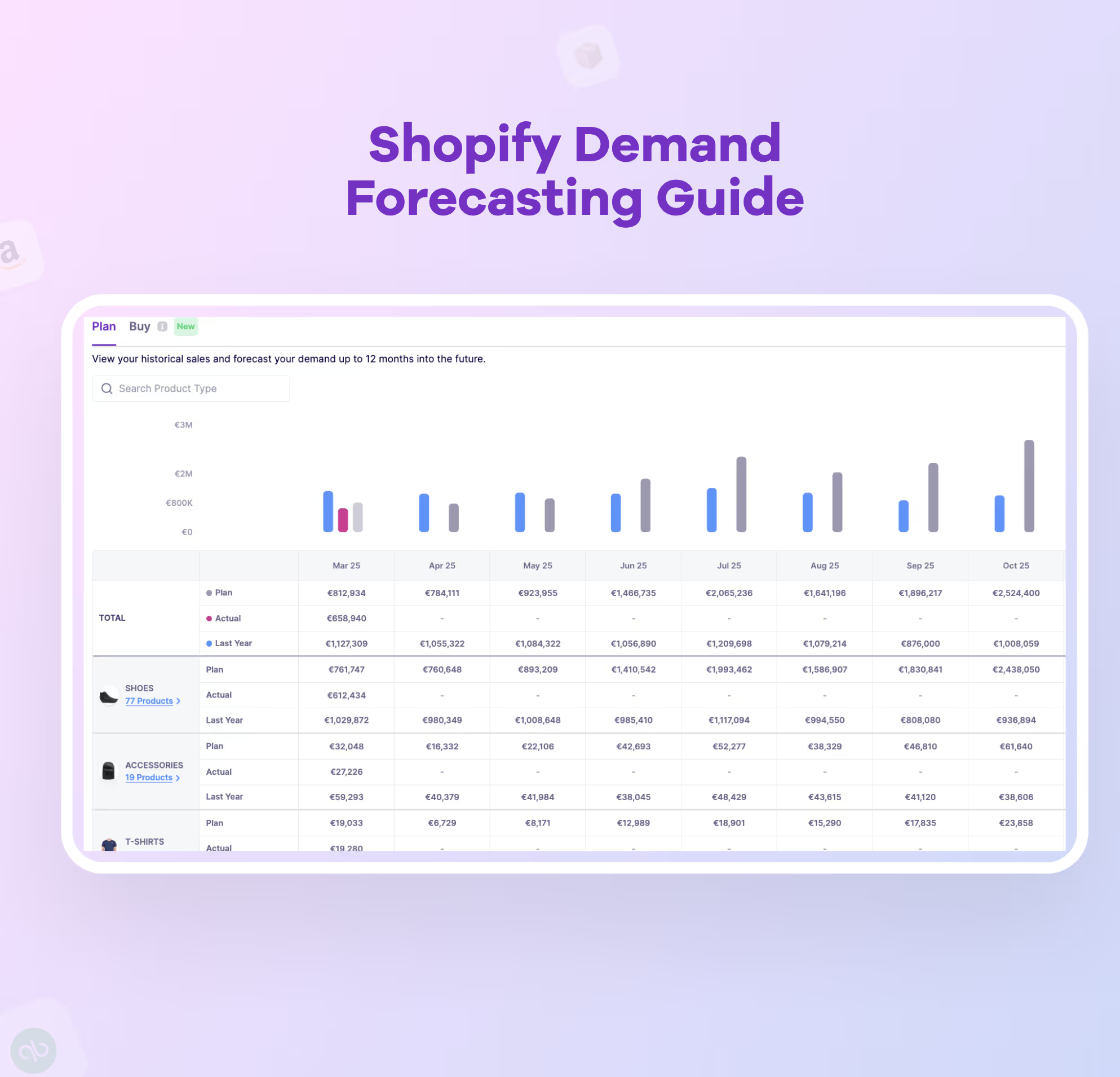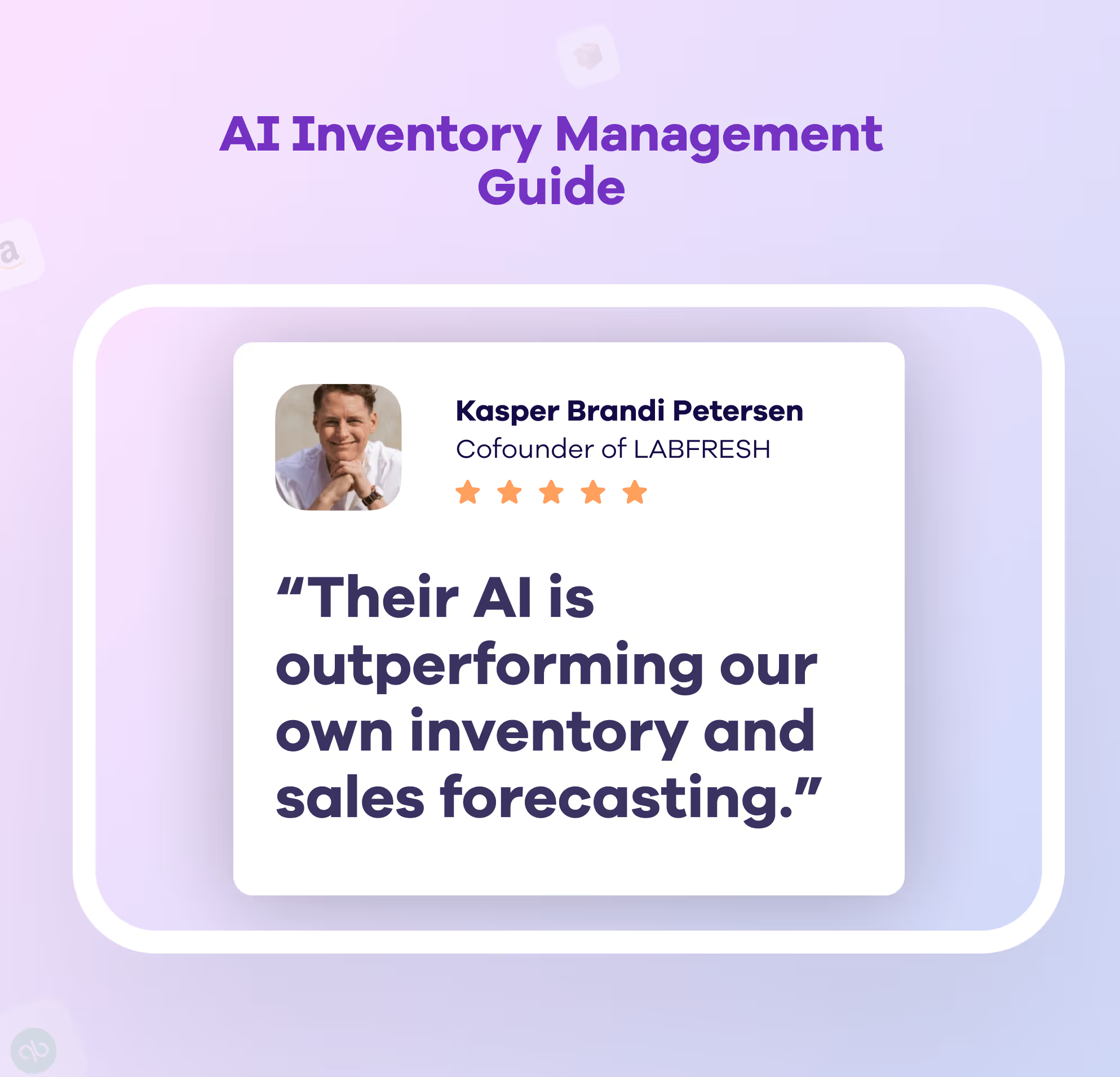Most brands think inventory forecasting is a “spreadsheet problem.” It’s not. It’s a human-capacity problem.
No matter how experienced your team is, no one can manually track thousands of data points, including hourly sales swings, seasonality shifts, marketing spikes, and supplier delays, in real time.
That’s why even the best planners still miss forecasts, overbuy stock, or run out at the worst moment.
AI agents, on the other hand, can monitor your store 24/7, process every data signal instantly, and tell you exactly what to reorder, when, and how much. In short, they give superpowers to your planners.
We break down how AI agents for inventory forecasting are being used today, and compares the first movers building real solutions in this space.
What Features Your AI Agent for Inventory Forecasting Must Have
If you’re considering adding an AI agent for inventory forecasting to your workflow, check the following features before you hit install.
1. Real-time, multi-source data integration
An AI agent is only as good as the data it sees.
It should connect directly to Shopify and instantly ingest and consolidate data from all relevant sources, including POS, ERP, WMS, 3PL, and other tools.
Real-time data processing is key to detecting sudden shifts (e.g., a viral social media trend) and adjusting the forecast before inventory runs out.
2. Smart demand forecasting
The core job of the agent: predicting what you’ll need and when. Look for AI that factors in seasonality, sales velocity, trends, promos, and sudden demand swings, not just historical averages.
It should predict demand at the most granular level: SKU (Stock Keeping Unit) x Location x Day x Channel.
3. Automated reorder recommendations
Your forecasting agent should do more than inform; it should act. That means generating reorder suggestions tied to lead times, safety stock, and supplier MOQ. Bonus points if it tells you why it's recommending what it is.
4. Exception management with stockout & overstock alerts
Instead of making a planner review every SKU, the agent should only surface critical exceptions.
It should alert you when a SKU is at risk of running out, when a product is overstocked, or when a spike in sales needs immediate attention.
This improves planner efficiency dramatically.
5. Autonomous decision-making (with guardrails)
An effective AI agent for inventory forecasting is capable of reasoning, acting, and adapting autonomously.
It should be able to automatically execute routine tasks like generating purchase orders (POs) or internal stock transfers based on its forecast, without human intervention.
It must also have guardrails (safety controls) built in, such as mandatory human approval for orders exceeding a set dollar limit or a maximum order quantity.
6. Scenario planning
The best agents can run “what-if” simulations or let you adjust forecasts to see how different numbers/scenarios impact your forecast.
What if sales double this week? What if your supplier delays by 10 days? What if a new product goes viral? These simulations help you plan for real-world uncertainty before it hits.
This kind of scenario modeling is essential for understanding your true supply chain resilience.
Comparison of Best AI Agents for Inventory Forecasting
Top 8 AI Agents for Inventory Forecasting
When it comes to choosing AI agents for inventory forecasting, there are two broad categories that exist.
First, you have inventory platforms with pre-built AI agents baked directly into the product. Second, you have AI agent–builder platforms that let you create custom agents from scratch.
To make this easier, we’ve divided the list into two parts: Pre-built AI agents and Build-your-own AI agent platforms.
Pre-built AI agents for inventory forecasting
With pre-built AI agents, the heavy lifting is done for you. The logic for forecasting, replenishment, MOQs, lead times, safety stock, etc already exists inside the platform.
You don’t have to train models, configure datasets, or build workflows from scratch. These agents are truly plug-and-play: connect your Shopify store, set your basic numbers, and the AI takes care of the execution automatically.
Some of these agents include.
1. Prediko

Prediko is one of the first inventory platforms to launch a fully integrated AI agent for inventory forecasting and operational tasks like replenishment, PO management, and raw-material planning.
Unlike tools that bolt on generic AI, Prediko’s agent is built entirely in-house and trained on 25M+ SKUs across 15 industries, giving it a deep understanding of real SKU behavior and D2C inventory patterns.
Prediko’s AI Agent executes your commands, not just answers questions, including creating and updating POs, refreshing forecasts for up to 12 months, generating and scheduling reports, and more.
So, instead of navigating multiple screens, you can ask the agent and turn complex inventory management into simple chat-based actions.
Key features
- AI-powered demand forecasts accounting for seasonality, growth, and current stock
- Recommends how much to buy and when across SKUs and locations
- Selects SKUs, refreshes demand plans, and creates draft purchase orders
- Creates, opens, filters, and schedules reports based on your requests
- Updates expected delivery dates, changes PO status, edits quantities, and manages incoming stock
- Understands and remembers context within the current session for smoother, more coherent conversations
- Uses Prediko’s documentation to answer platform questions and guide workflows
Pricing
Prediko offers tiered pricing based on your store’s revenue. Plans start at just $49/month for small businesses and scale up to $119, $199, and $349/month for more advanced needs. All plans include unlimited SKUs, purchase orders, and users.
2. Blue Ridge
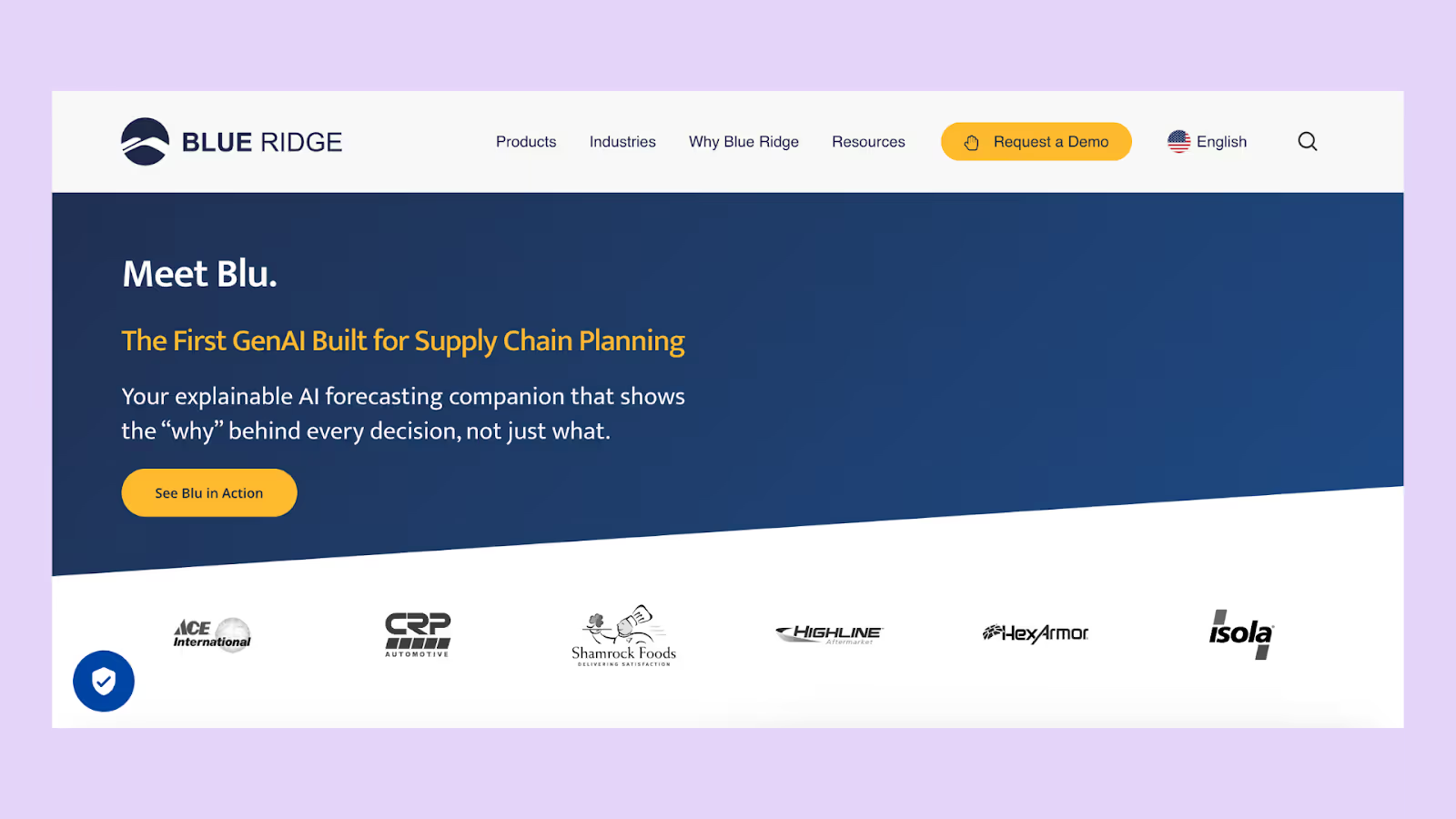
Blue Ridge is a supply chain planning platform powered by GenAI that helps bring full transparency and explainability to inventory forecasting.
Its AI companion, Blu, breaks down the “why” behind every forecast by showing the drivers, model choices, and assumptions in plain language.
The software helps planners, supply chain teams, and executives understand demand shifts, validate replenishment decisions, and act with confidence.
Key features
- Clear, plain-language explanations for every forecast to understand the “why” behind changes
- Breaks down demand drivers, model choices, and pre/mid/post calculation steps with simple visual and written explanations
- Fully embedded in dashboards and approval workflows
- Runs multiple models per SKU daily and auto-selects the best one based on accuracy and behavior
Pricing
Custom quote based on your specific business needs.
3. Netstock

Netstock is an inventory optimization and demand planning platform that uses AI to help brands reduce excess stock, prevent stockouts, and place smarter orders.
Its forecasting engine automatically selects the best model for every item to deliver reliable, actionable forecasts.
Its AI agents offer explainable insights, automated summaries, risk detection, and supplier communication to simplify planning for both operational teams and executives.
Key features
- AI dashboard summaries to interpret complex charts and offer recommendations
- Item-level analysis for instant insights into SKU status, risks, and relevant actions
- Item Troubleshooter to explain issues and deliver practical steps to resolve issues
- Report Explainer that clarifies the purpose and meaning of analytics reports
- Inventory Email Agents that draft supplier emails to address different issues
- Safety Stock Explainer that analyzes safety stock coverage and highlights risk
- Predictor IA & IBP engines for demand forecasting, inventory ordering, and more
Pricing
Custom quote based on your specific business needs.
4. Polar Analytics

Polar Analytics offers an AI-powered inventory planner agent that predicts when each SKU will run out of stock and provides precise reorder timing and quantities based on sales velocity, lead times, and channel signals from Shopify, Meta, Amazon, ERPs, and 3PLs.
By unifying multi-channel data, Polar eliminates manual spreadsheet work, surfaces risks earlier, and helps merchants make proactive, revenue-saving decisions.
Key features
- AI stockout prediction that identifies when each SKU will run out
- Recommends the reorder timing and quantity
- Real-time alerts that highlight fast-moving SKUs, items at risk, and revenue leakage
- Predict demand 30 days earlier with auto-synced stock data, velocity, and lead times
- 48-hour go-live with quick setup and auto-generated demand forecasts
Pricing
Custom quote based on your specific business needs.
AI agent-builder platforms
Now that we’ve covered platforms with built-in inventory AI agents, we’ll shift focus to platforms that help you build your own AI agents from scratch.
The tools below require you to design the forecasting and replenishment logic yourself, collect and clean the data, define the workflows, and configure every part of the decision engine.
They offer complete flexibility and control, but also demand more technical expertise, more time, and a deeper understanding of your supply chain.
5. Akira
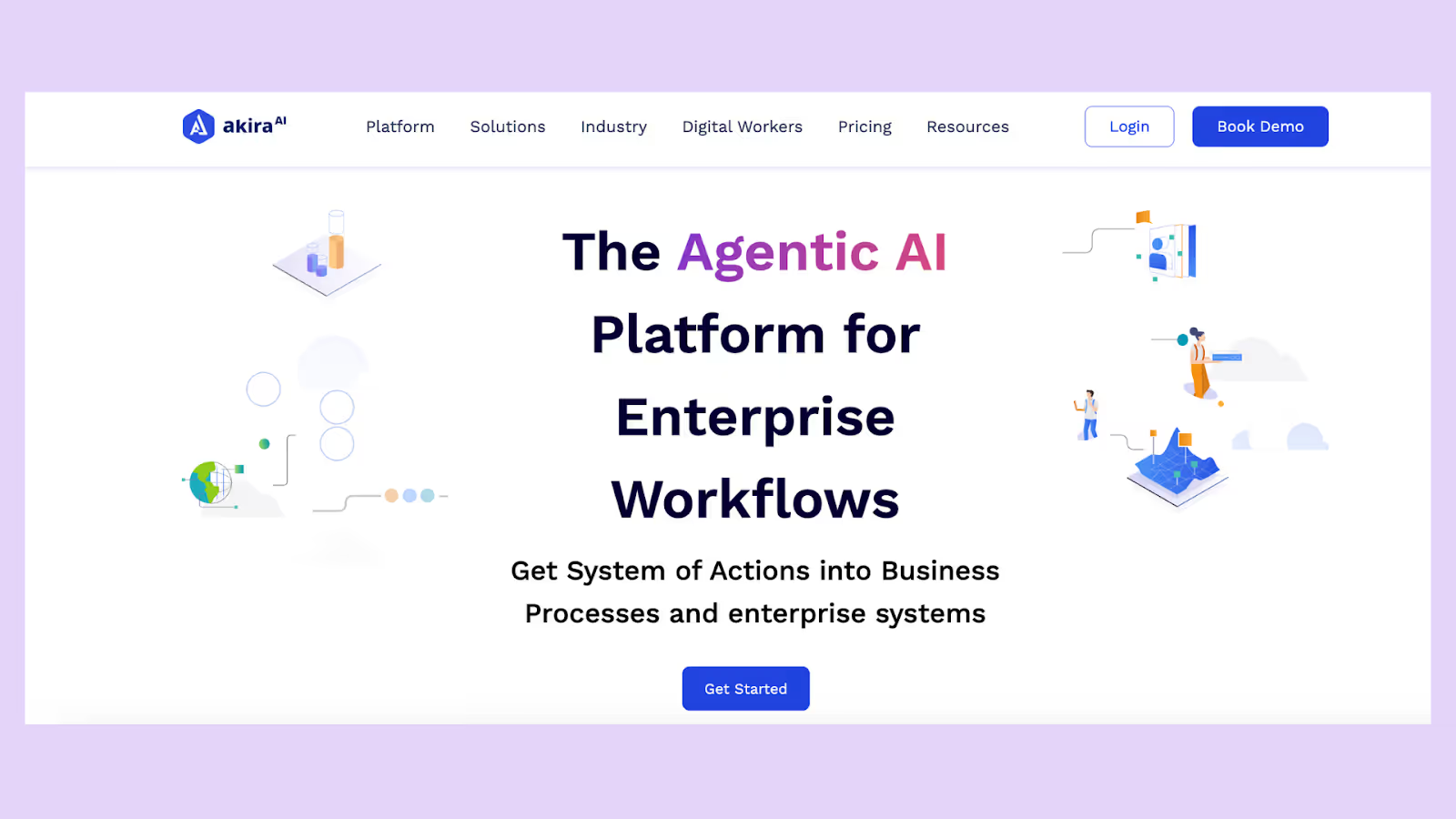
Akira is an agent-builder platform that enables retailers to create their own AI-powered inventory forecasting, replenishment, and automation agents from the ground up.
Instead of offering a fixed, pre-built logic, Akira gives teams the tools to design forecasting models, build replenishment workflows, integrate multi-source data, and orchestrate end-to-end operations using customizable AI automations.
It also has pre-built agentic templates that you can use or modify according to your business needs.
Key features
- Autonomous multi-agent task execution to remove manual checks
- Connects with existing CRMs, ERPs, legacy systems, and cloud platforms
- Ethical, transparent, and compliant AI agents aligned with governance standards
- Prompt management to handle AI operations with structure and consistency
- Offers ready-to-use agents, including demand forecasting, replenishment, logistics, and pricing and promotion agents
Pricing
They offer an AI agent cost calculator to estimate based on your specific setup and usage needs.
6. Relevance

Relevance AI helps teams build, deploy, and manage AI agents that automate recurring tasks, orchestrate cross-functional workflows, and centralize reporting.
The software allows operations, sales, marketing, and support teams to create autonomous AI teammates that coordinate work across departments, monitor SLAs, identify bottlenecks, and surface real-time performance insights.
Key features
- Automate multi-team coordination, track task progress, send status updates, and escalate blockers
- Monitor SLAs, detect bottlenecks, unify data from multiple systems, and recommend process improvements
- Deploy multiple AI agents that work together to execute complex workflows
- Generate unified, real-time reports and KPIs to continuously optimize processes
- Safe deployment with robust controls, monitoring, and compliance frameworks
Pricing
Plans start at $29 per month.
7. Alloy
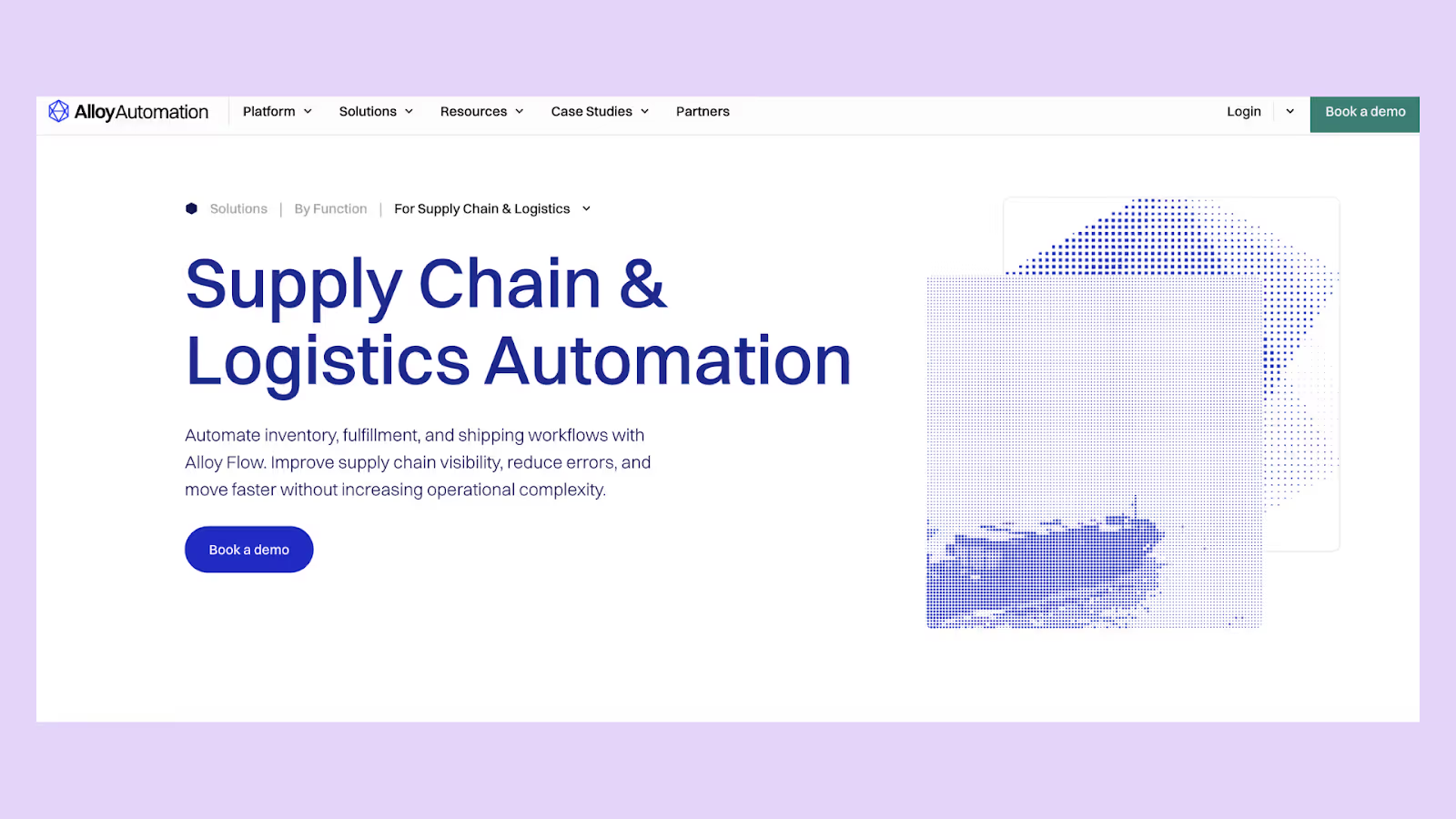
Alloy is an agentic AI platform that allows teams to securely build AI agents and connect them to thousands of APIs, MCP servers, and product integrations, enabling fully autonomous, action-taking agents.
Instead of building integrations from scratch, Alloy provides a unified toolkit combining connectivity APIs, embedded iPaaS, and Model Context Protocol (MCP) infrastructure.
Key features
- Build agents with Connectivity API, MCP Connectivity, or Embedded iPaaS
- Create AI workflows without needing to research schemas or endpoints
- Build white-label integrations quickly using a drag-and-drop interface
- SOC 2 Type II certified infrastructure with permissions, auth management, and governance controls
- Built-in logging, routing, and safe execution for reliable multi-agent operations
Pricing
Custom quote based on your specific business needs.
8. Beam AI
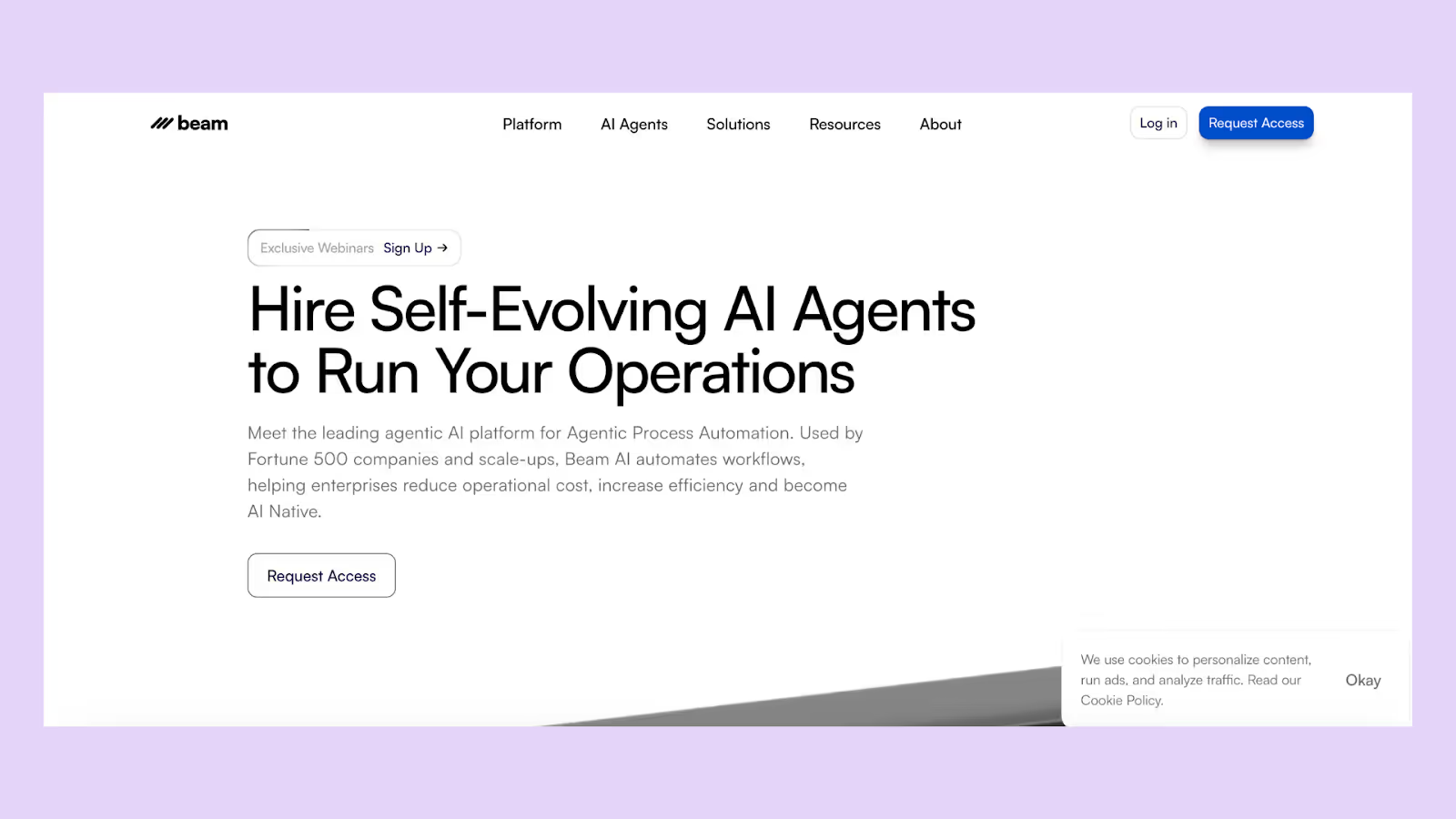
Lastly, we have Beam, an enterprise-grade agentic automation platform that also lets you build, deploy, and manage AI agents that automate processes end-to-end.
Designed as a central hub for operational AI, Beam provides everything for orchestrating workflows, integrating with business systems, modifying agents to internal SOPs, and maintaining full oversight of your AI workforce.
Key features
- AI Agent hub to manage, monitor, and oversee all the agents
- AI tools library to access hundreds of ready-to-use agents or create custom ones
- Activate agents automatically based on events, system updates, or embedded workflows
- Supports multi-user access and smooth team coordination
- Deploy in the cloud, private cloud, or fully on-premise for compliance
- GDPR-compliant, ISO 27001 and SOC 2 certified
- Connects with tools like Airtable, Asana, Sage, and ClickUp for task execution
Pricing
Custom quote based on your specific business needs.
How to Choose the Right AI Agent for Inventory Forecasting?
Choosing an AI agent for inventory forecasting isn’t just about features; it’s about how reliably the agent can support (and eventually automate) your day-to-day operations.
Most inventory AI agents today are still evolving, so it’s important to focus on fundamentals rather than shiny claims.
1. Prioritize data accuracy over “smartness”
Even the best AI agent will fail if the data feeding it is inconsistent. Make sure the agent can sync cleanly with Shopify, your WMS, and your inventory purchasing workflows. Real-time sync is non-negotiable.
2. Look for an agent that understands inventory logic
Forecasting isn’t just prediction; it’s reorder rules, MOQs, lead times, safety stock, supplier mapping, and seasonality. Choose or build an agent that handles these nuances instead of giving generic suggestions.
3. Evaluate how much it can actually execute
Some agents can only answer questions. Others can take actions like refreshing forecasts, creating POs, editing quantities, or identifying stockouts. Prioritize agents that reduce clicks, not just provide insights.
4. Check the level of customization
Every brand’s inventory is different. The agent should adapt to your SKU behavior, supplier constraints, and planning logic, not force you into rigid templates.
5. Look for transparency
A good AI agent should explain why it recommends a reorder quantity or flags a product. This matters especially for high-value SKUs or fast-moving items.
6. Consider your team’s workflow
The best AI agent fits into your existing processes. Whether it's chat-based actions, automated alerts, or PO creation, choose one that your team can adopt easily.
7. Think long-term: will it scale with you?
As your catalog grows, multi-store expands, or suppliers change, the agent should grow with you. Scalability matters more than fancy features.
8. Look at how fast the product is evolving
Inventory AI is early. Pick a tool that’s shipping improvements regularly and actively learning from real merchant data, not a static tool making exaggerated claims.
Why Shopify Brands Choose Prediko’s AI Agent for Inventory Forecasting
If you're running one or multiple Shopify stores, Prediko is AI agent built specifically for you. It stands apart with its ability to combine forecasting + execution in one place.
Most tools can predict demand; Prediko goes further by turning those predictions into actual actions: refreshing forecasts, creating draft POs, updating delivery dates, surfacing stock risks, and guiding you through operational decisions using natural language. Everything is built in-house, fully integrated, and designed to replace manual planning.
By taking over repetitive tasks and reducing human error, Prediko gives you speed, clarity, and accuracy that DIY agent builders or generic AI tools simply can’t match.
See it for yourself with a free 14-day trial.
Frequently Asked Questions
What are AI agents for inventory forecasting?
AI agents for inventory forecasting are automated tools that predict future stock needs, identify demand patterns, and assist with tasks like replenishment and PO creation using machine learning and real-time data.
How do AI agents for inventory forecasting work?
They analyze sales history, seasonality, trends, lead times, and inventory movements to generate accurate demand forecasts and suggest or automate replenishment actions.
What are the main benefits of AI agents for inventory forecasting?
They improve forecasting accuracy, reduce stockouts and overstocking, automate manual tasks, speed up decision-making, and help brands maintain optimal inventory levels.
Which businesses should use AI agents for inventory forecasting?
Any product-based business, especially ecommerce, D2C, retail, FMCG, and multi-store operations, can use them to scale inventory planning and reduce operational errors.
How soon can you see results after using AI agents for inventory forecasting?
Most brands see improvements within a few weeks as the system analyzes data, optimizes reorder points, and automates repetitive tasks.
Are AI agents for inventory forecasting compatible with Shopify and ERP systems?
Many modern AI agents connect seamlessly with Shopify, ERPs, WMS tools, and other systems. Prediko is purpose-built exclusively for Shopify merchants.



